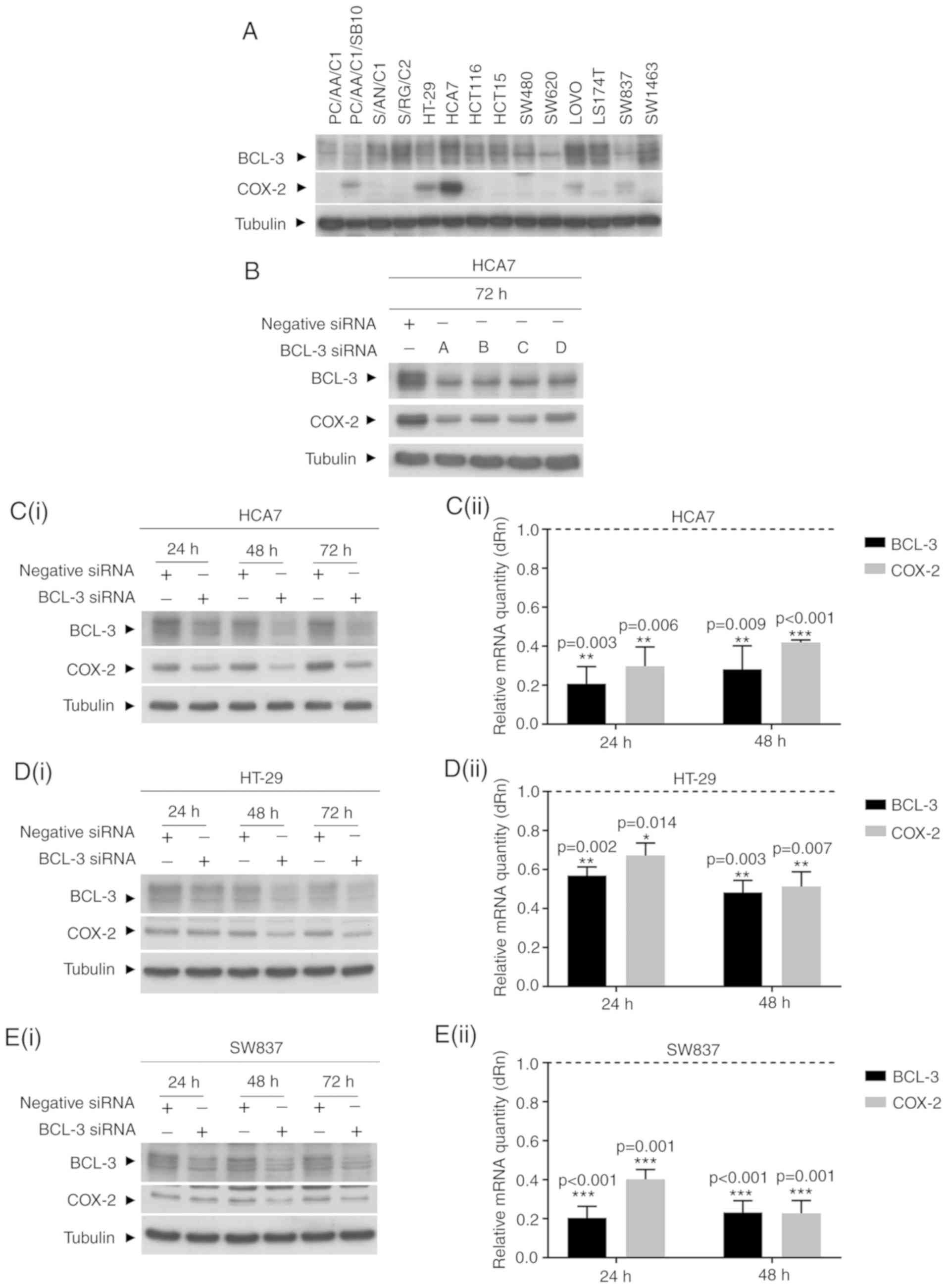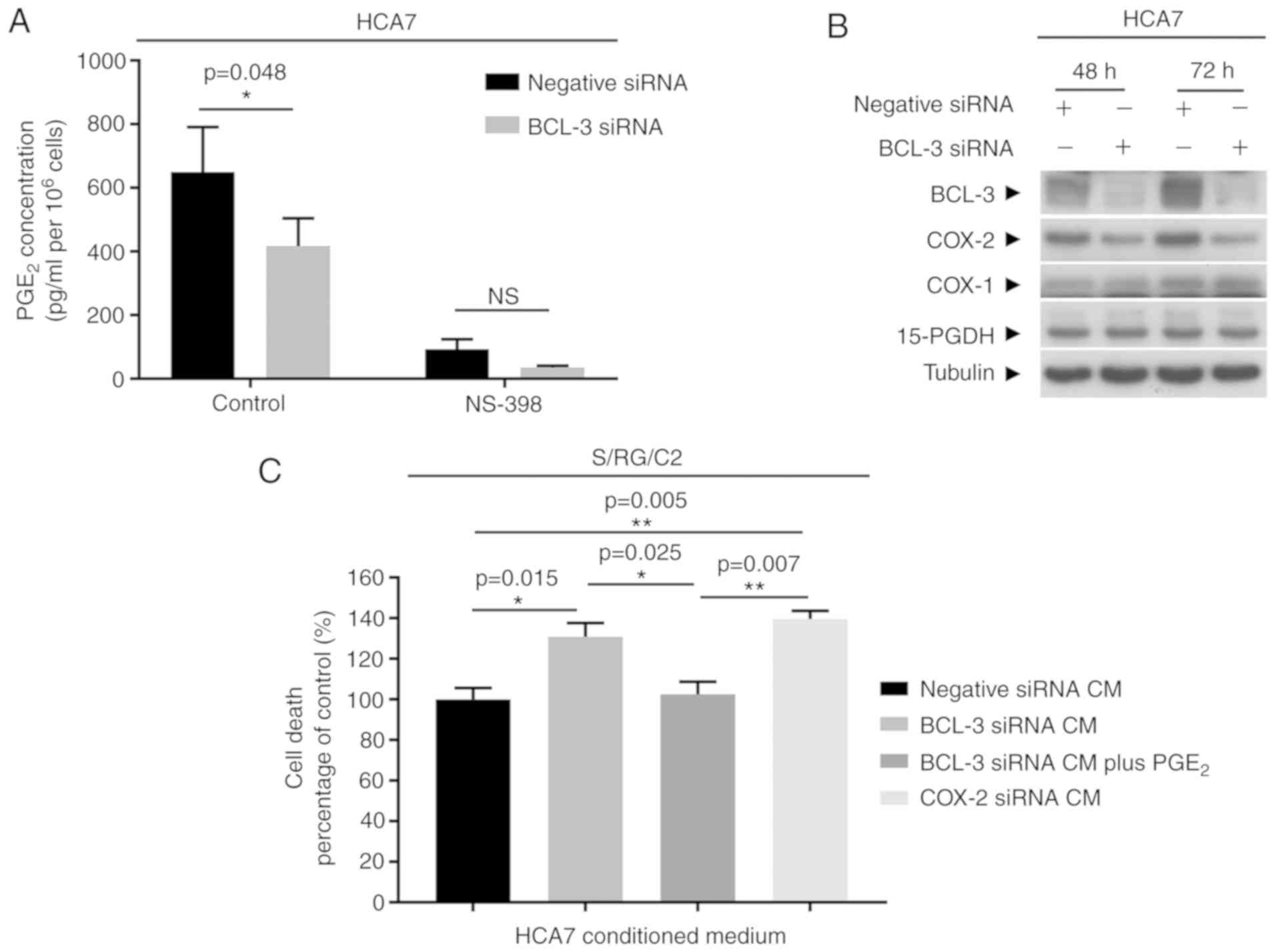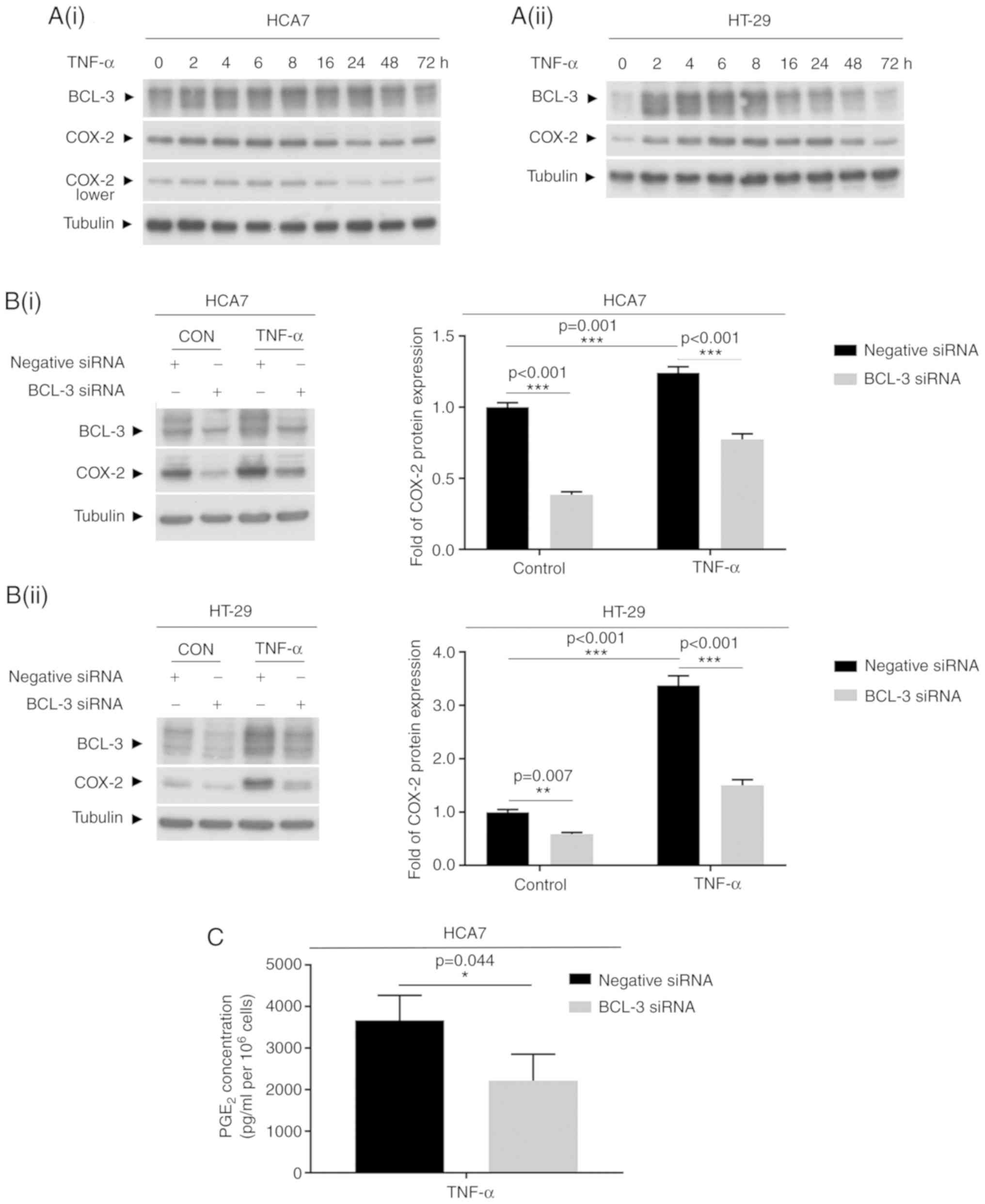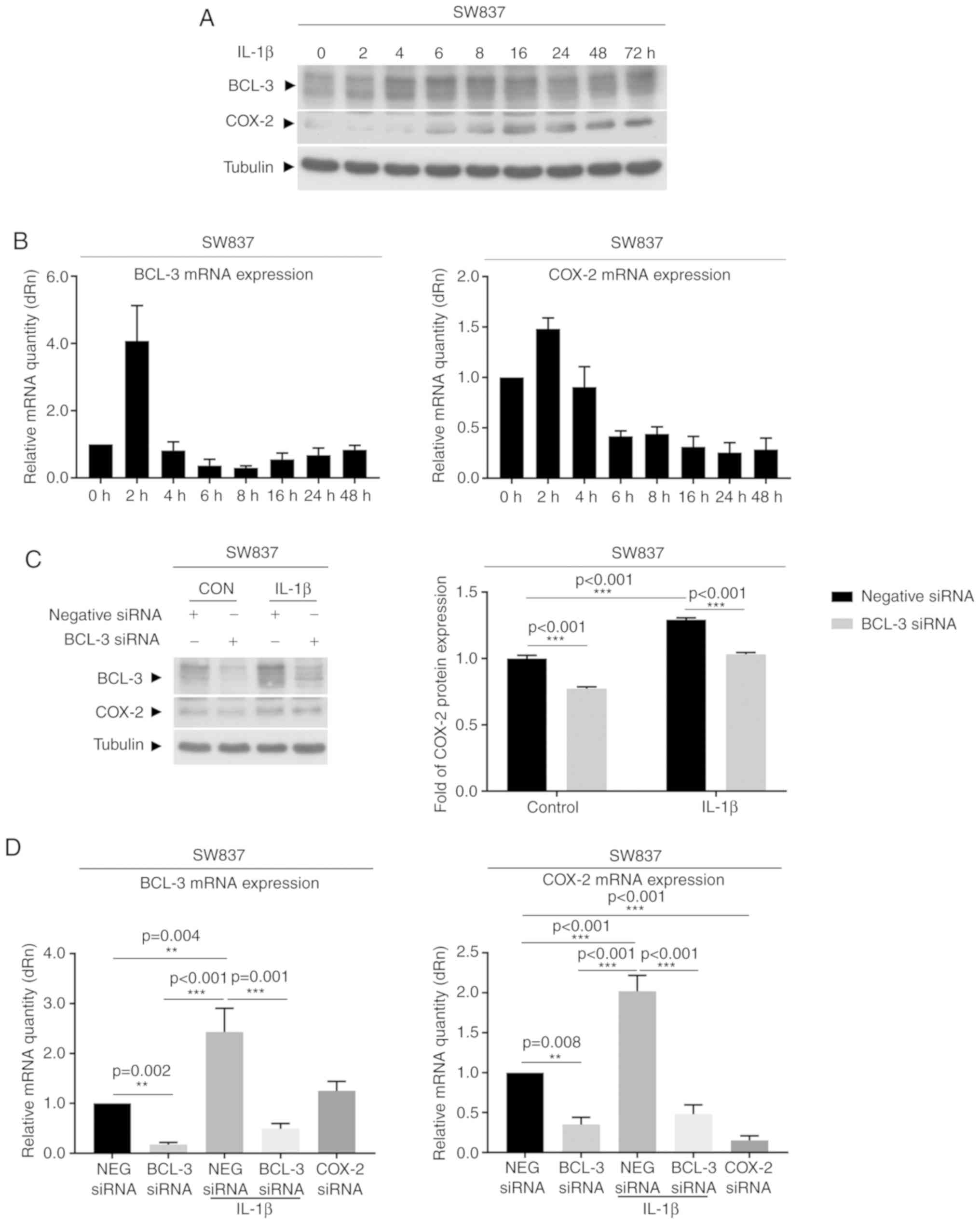|
1
|
Stewart BW and Wild CP: World cancer
report 2014. International Agency for Research on Cancer; Lyon:
2014, https://publications.iarc.fr/Non-Series-Publications/World-Cancer-Reports/World-Cancer-Report-2014.
|
|
2
|
Bowel cancer mortality statistics, 2014.
Cancer Research UK; Oxford; 2014, http://www.cancerresearchuk.org/health-professional/cancer-statistics/statisticsby-cancer-type/bowel-cancer/mortality
Accessed September 6, 2017.
|
|
3
|
Lucas C, Barnich N and Nguyen HTT:
Microbiota, inflammation and colorectal cancer. Int J Mol Sci.
18:pii: E1310. 2017.PubMed/NCBI
|
|
4
|
Long AG, Lundsmith ET and Hamilton KE:
Inflammation and colorectal cancer. Curr Colorectal Cancer Rep.
13:341–331. 2017. View Article : Google Scholar : PubMed/NCBI
|
|
5
|
Janakiram NB and Rao CV: The role of
inflammation in colon cancer. Adv Exp Med Biol. 816:25–52. 2014.
View Article : Google Scholar : PubMed/NCBI
|
|
6
|
Greenhough A, Smartt HJ, Moore AE, Roberts
HR, Williams AC, Paraskeva C and Kaidi A: The COX-2/PGE2 pathway:
Key roles in the hallmarks of cancer and adaptation to the tumour
micro-environment. Carcinogenesis. 30:377–386. 2009. View Article : Google Scholar : PubMed/NCBI
|
|
7
|
Wang S, Liu Z, Wang L and Zhang X:
NF-kappaB signaling pathway, inflammation and colorectal cancer.
Cell Mol Immunol. 6:327–334. 2009. View Article : Google Scholar : PubMed/NCBI
|
|
8
|
Karin M: Nuclear factor-kappaB in cancer
development and progression. Nature. 441:431–436. 2006. View Article : Google Scholar : PubMed/NCBI
|
|
9
|
Taniguchi K and Karin M: NF-κB,
inflammation, immunity and cancer: Coming of age. Nat Rev Immunol.
18:309–324. 2018. View Article : Google Scholar : PubMed/NCBI
|
|
10
|
Nguyen LK, Cavadas MA, Kholodenko BN,
Frank TD and Cheong A: Species differential regulation of COX2 can
be described by an NFκB-dependent logic AND gate. Cell Mol Life
Sci. 72:2431–2443. 2015. View Article : Google Scholar : PubMed/NCBI
|
|
11
|
Pereira SG and Oakley F: Nuclear
factor-kappaB1: Regulation and function. Int J Biochem Cell Biol.
40:1425–1430. 2008. View Article : Google Scholar
|
|
12
|
Oeckinghaus A and Ghosh S: The NF-kappaB
family of transcription factors and its regulation. Cold Spring
Harb Perspect Biol. 1:a0000342009. View Article : Google Scholar
|
|
13
|
McKeithan TW, Ohno H and Diaz MO:
Identification of a transcriptional unit adjacent to the breakpoint
in the 14;19 trans-location of chronic lymphocytic leukemia. Genes
Chromosomes Cancer. 1:247–255. 1990. View Article : Google Scholar : PubMed/NCBI
|
|
14
|
Ohno H, Takimoto G and McKeithan TW: The
candidate proto-oncogene bcl-3 is related to genes implicated in
cell lineage determination and cell cycle control. Cell.
60:991–997. 1990. View Article : Google Scholar : PubMed/NCBI
|
|
15
|
Bours V, Franzoso G, Azarenko V, Park S,
Kanno T, Brown K and Siebenlist U: The oncoprotein Bcl-3 directly
transactivates through kappa B motifs via association with
DNA-binding p50B homodimers. Cell. 72:729–739. 1993. View Article : Google Scholar : PubMed/NCBI
|
|
16
|
Nolan GP, Fujita T, Bhatia K, Huppi C,
Liou HC, Scott ML and Baltimore D: The bcl-3 proto-oncogene encodes
a nuclear I kappa B-like molecule that preferentially interacts
with NF-kappa B p50 and p52 in a phosphorylation-dependent manner.
Mol Cell Biol. 13:3557–3566. 1993. View Article : Google Scholar : PubMed/NCBI
|
|
17
|
Franzoso G, Bours V, Azarenko V, Park S,
Tomita-Yamaguchi M, Kanno T, Brown K and Siebenlist U: The
oncoprotein Bcl-3 can facilitate NF-kappa B-mediated
transactivation by removing inhibiting p50 homodimers from select
kappa B sites. EMBO J. 12:3893–3901. 1993. View Article : Google Scholar : PubMed/NCBI
|
|
18
|
Palmer S and Chen YH: Bcl-3, a
multifaceted modulator of NF-kappaB-mediated gene transcription.
Immunol Res. 42:210–218. 2008. View Article : Google Scholar : PubMed/NCBI
|
|
19
|
Legge DN, Chambers AC, Parker CT, Timms P,
Collard TJ and Williams AC: The role of B-Cell Lymphoma-3 (BCL-3)
in enabling the hallmarks of cancer: Implications for the treatment
of colorectal carcinogenesis. Carcinogenesi. Jan 13–2020.Epub ahead
of print. View Article : Google Scholar
|
|
20
|
Maldonado V and Melendez-Zajgla J: Role of
Bcl-3 in solid tumors. Mol Cancer. 10:1522011. View Article : Google Scholar : PubMed/NCBI
|
|
21
|
Cogswell PC, Guttridge DC, Funkhouser WK
and Baldwin AS Jr: Selective activation of NF-kappa B subunits in
human breast cancer: Potential roles for NF-kappa B2/p52 and for
Bcl-3. Oncogene. 19:1123–1131. 2000. View Article : Google Scholar : PubMed/NCBI
|
|
22
|
Wakefield A, Soukupova J, Montagne A,
Ranger J, French R, Muller WJ and Clarkson RW: Bcl3 selectively
promotes metastasis of ERBB2-driven mammary tumors. Cancer Res.
73:745–755. 2013. View Article : Google Scholar
|
|
23
|
Urban BC, Collard TJ, Eagle CJ, Southern
SL, Greenhough A, Hamdollah-Zadeh M, Ghosh A, Poulsom R, Paraskeva
C, Silver A and Williams AC: BCL-3 expression promotes colorectal
tumorigenesis through activation of AKT signalling. Gut.
65:1151–1164. 2016. View Article : Google Scholar :
|
|
24
|
Legge DN, Shephard AP, Collard TJ,
Greenhough A, Chambers AC, Clarkson RW, Paraskeva C and Williams
AC: BCL-3 promotes a cancer stem cell phenotype by enhancing
beta-catenin signalling in colorectal tumour cells. Dis Model Mech.
12:pii: dmm037697. 2019. View Article : Google Scholar
|
|
25
|
Liu Z, Jiang Y, Hou Y, Hu Y, Cao X, Tao Y,
Xu C, Liu S, Wang S, Wang L, et al: The IκB family member Bcl-3
stabilizes c-Myc in colorectal cancer. J Mol Cell Biol. 5:280–282.
2013. View Article : Google Scholar : PubMed/NCBI
|
|
26
|
Puvvada SD, Funkhouser WK, Greene K, Deal
A, Chu H, Baldwin AS, Tepper JE and O'Neil BH: NF-kB and Bcl-3
activation are prognostic in metastatic colorectal cancer.
Oncology. 78:181–188. 2010. View Article : Google Scholar : PubMed/NCBI
|
|
27
|
Saamarthy K, Björner S, Johansson M,
Landberg G, Massoumi R, Jirström K and Masoumi KC: Early diagnostic
value of Bcl-3 localization in colorectal cancer. BMC Cancer.
15:3412015. View Article : Google Scholar : PubMed/NCBI
|
|
28
|
Collins PE, Kiely PA and Carmody RJ:
Inhibition of transcription by B cell Leukemia 3 (Bcl-3) protein
requires interaction with nuclear factor κB (NF-κB) p50. J Biol
Chem. 289:7059–7067. 2014. View Article : Google Scholar : PubMed/NCBI
|
|
29
|
Brocke-Heidrich K, Ge B, Cvijic H, Pfeifer
G, Löffler D, Henze C, McKeithan TW and Horn F: BCL3 is induced by
IL-6 via Stat3 binding to intronic enhancer HS4 and represses its
own transcription. Oncogene. 25:7297–7304. 2006. View Article : Google Scholar : PubMed/NCBI
|
|
30
|
Liu Y, Sun H, Hu M, Zhang Y, Chen S, Tighe
S and Zhu Y: The role of cyclooxygenase-2 in colorectal
carcinogenesis. Clin Colorectal Cancer. 16:165–112. 2017.
View Article : Google Scholar
|
|
31
|
Wang D and Dubois RN: The role of COX-2 in
intestinal inflammation and colorectal cancer. Oncogene.
29:781–788. 2010. View Article : Google Scholar
|
|
32
|
Skeen VR, Collard TJ, Southern SL,
Greenhough A, Hague A, Townsend PA, Paraskeva C and Williams AC:
BAG-1 suppresses expression of the key regulatory cytokine
transforming growth factor β (TGF-β1) in colorectal tumour cells.
Oncogene. 32:4490–4499. 2013. View Article : Google Scholar
|
|
33
|
Paraskeva C, Finerty S, Mountford RA and
Powell SC: Specific cytogenetic abnormalities in two new human
colorectal adenoma-derived epithelial cell lines. Cancer Res.
49:1282–1286. 1989.PubMed/NCBI
|
|
34
|
Williams AC, Harper SJ and Paraskeva C:
Neoplastic transformation of a human colonic epithelial cell line:
In vitro evidence for the adenoma to carcinoma sequence. Cancer
Res. 50:4724–4730. 1990.PubMed/NCBI
|
|
35
|
Elder DJ, Halton DE, Crew TE and Paraskeva
C: Apoptosis induction and cyclooxygenase-2 regulation in human
colorectal adenoma and carcinoma cell lines by the
cyclooxygenase-2-selective non-steroidal anti-inflammatory drug
NS-398. Int J Cancer. 86:553–560. 2000. View Article : Google Scholar : PubMed/NCBI
|
|
36
|
Southern SL, Collard TJ, Urban BC, Skeen
VR, Smartt HJ, Hague A, Oakley F, Townsend PA, Perkins ND,
Paraskeva C and Williams AC: BAG-1 interacts with the p50-p50
homodimeric NF-κB complex: Implications for colorectal
carcinogenesis. Oncogene. 31:2761–2772. 2012. View Article : Google Scholar
|
|
37
|
Hague A, Manning AM, Hanlon KA, Huschtscha
LI, Hart D and Paraskeva C: Sodium butyrate induces apoptosis in
human colonic tumour cell lines in a p53-independent pathway:
Implications for the possible role of dietary fibre in the
prevention of large-bowel cancer. Int J Cancer. 55:498–505. 1993.
View Article : Google Scholar : PubMed/NCBI
|
|
38
|
Livak KJ and Schmittgen TD: Analysis of
relative gene expression data using real-time quantitative PCR and
the 2(-Delta Delta C(T)) method. Methods. 25:402–408. 2001.
View Article : Google Scholar
|
|
39
|
Williams AC, Browne SJ, Yeudal WA,
Paterson IC, Marshall CJ, Lane DP and Paraskeva C: Molecular events
including p53 and k-ras alterations in the in vitro progression of
a human colorectal adenoma cell line to an adenocarcinoma.
Oncogene. 8:3063–3072. 1993.PubMed/NCBI
|
|
40
|
Moore AE, Greenhough A, Roberts HR, Hicks
DJ, Patsos HA, Williams AC and Paraskeva C: HGF/Met signalling
promotes PGE(2) biogenesis via regulation of COX-2 and 15-PGDH
expression in colorectal cancer cells. Carcinogenesis.
30:1796–1804. 2009. View Article : Google Scholar : PubMed/NCBI
|
|
41
|
Al-Kharusi MR, Smartt HJ, Greenhough A,
Collard TJ, Emery ED, Williams AC and Paraskeva C: LGR5 promotes
survival in human colorectal adenoma cells and is upregulated by
PGE2: Implications for targeting adenoma stem cells with NSAIDs.
Carcinogenesis. 34:1150–1157. 2013. View Article : Google Scholar : PubMed/NCBI
|
|
42
|
Popivanova BK, Kitamura K, Wu Y, Kondo T,
Kagaya T, Kaneko S, Oshima M, Fujii C and Mukaida N: Blocking
TNF-alpha in mice reduces colorectal carcinogenesis associated with
chronic colitis. J Clin Invest. 118:560–570. 2008.PubMed/NCBI
|
|
43
|
Coussens LM and Werb Z: Inflammation and
cancer. Nature. 420:860–867. 2002. View Article : Google Scholar : PubMed/NCBI
|
|
44
|
Ahlqvist K, Saamarthy K, Syed Khaja AS,
Bjartell A and Massoumi R: Expression of Id proteins is regulated
by the Bcl-3 proto-oncogene in prostate cancer. Oncogene.
32:1601–1608. 2013. View Article : Google Scholar
|
|
45
|
Pallares J, Martinez-Guitarte JL, Dolcet
X, Llobet D, Rue M, Palacios J, Prat J and Matias-Guiu X:
Abnormalities in the NF-kappaB family and related proteins in
endometrial carcinoma. J Pathol. 204:569–577. 2004. View Article : Google Scholar : PubMed/NCBI
|
|
46
|
Thornburg NJ, Pathmanathan R and
Raab-Traub N: Activation of nuclear factor-kappaB p50
homodimer/Bcl-3 complexes in nasopharyngeal carcinoma. Cancer Res.
63:8293–8301. 2003.PubMed/NCBI
|
|
47
|
Kashatus D, Cogswell P and Baldwin AS:
Expression of the Bcl-3 proto-oncogene suppresses p53 activation.
Genes Dev. 20:225–235. 2006. View Article : Google Scholar :
|
|
48
|
Westerheide SD, Mayo MW, Anest V, Hanson
JL and Baldwin AS Jr: The putative oncoprotein Bcl-3 induces cyclin
D1 to stimulate G(1) transition. Mol Cell Bio. 21:8428–8436. 2001.
View Article : Google Scholar
|
|
49
|
Dechend R, Hirano F, Lehmann K, Heissmeyer
V, Ansieau S, Wulczyn FG, Scheidereit C and Leutz A: The Bcl-3
oncoprotein acts as a bridging factor between NF-kappaB/Rel and
nuclear co-regulators. Oncogene. 18:3316–3323. 1999. View Article : Google Scholar : PubMed/NCBI
|
|
50
|
Zelenay S, van der Veen AG, Böttcher JP,
Snelgrove KJ, Rogers N, Acton SE, Chakravarty P, Girotti MR, Marais
R, Quezada SA, et al: Cyclooxygenase-dependent tumor growth through
evasion of immunity. Cell. 162:1257–1270. 2015. View Article : Google Scholar : PubMed/NCBI
|
|
51
|
Süleyman H, Demircan B and Karagöz Y:
Anti-inflammatory and side effects of cyclooxygenase inhibitors.
Pharmacol Rep. 59:247–258. 2007.PubMed/NCBI
|


















